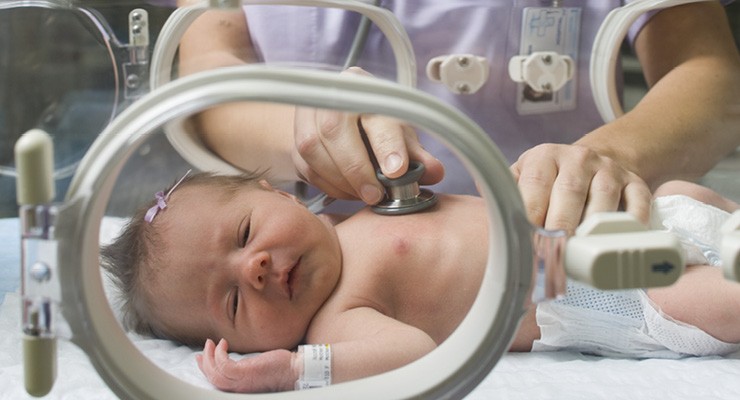The NICU: A Whole New World
Learn about what happens in the neonatal intensive care unit (NICU) and how the NICU supports your newborn.

The NICU is where babies get specialized medical care. For a new parent, the NICU is a strange place, filled with beeping machines, bustling nurses and blinking screens.
Along with being worried about your baby, you may still be recovering from giving birth. You may be tired and sore. Your partner may be exhausted, too. It’s easy to become overwhelmed. You may feel frightened, worried, or sad. These feelings are completely normal. But you’re not alone — there are people you can turn to for help.
Doctors and nurses will be giving you a lot of information about your baby’s health. And you may have many questions. The NICU team can explain what’s happening and tell you how your baby is doing. They will also explain their plan for your baby’s care.
The NICU staff will include:
Nurses — These include registered nurses (RNs), neonatal nurse practitioners (NNPs) and the charge nurse, who is in charge of the nurses on duty during a shift.
Doctors — Your doctors may include a neonatologist, who has special training working with newborns in the NICU. You may also see a pediatrician, who is trained to take care of babies and children.
Your neonatologist and pediatrician work together on your baby’s care. A neurologist (brain doctor), cardiologist (heart doctor) or doctors with other specialties may also be taking care of your baby.
There may be other specially trained staff helping with your baby, depending on his or her needs. They might include respiratory or physical therapists, social workers and nutritionists. It’s OK to ask them what their job is and for them to explain what they’re doing.
Don’t be afraid or embarrassed to ask as many questions as you need. It’s important for you to understand what’s happening.
You will also see a lot of equipment you’ve probably never seen before.
This is just a partial list:
- Bilirubin lights — Also called phototherapy lights. These are used to treat babies who have jaundice. Jaundice is common in newborns. It makes the skin and whites of the eyes look yellow.
- C-PAP — Also called continuous positive airway pressure. This machine gives the baby pressurized air through a small tube in the baby’s nose.
- Feeding pump — This machine slowly and steadily feeds the baby through a feeding tube.
- Feeding tube — This tube runs from the feeding pump to the baby’s nose and into the stomach to deliver food.
- Incubator — A special bed that keeps the baby warm.
- IVs and lines — An intravenous catheter (or IV) is a thin flexible tube inserted into the vein with a small needle.
- IV pump — This machine pumps the right amount of medicine or fluid into the IV line.
- Oxygen hood — This is a clear plastic hood that goes over the baby’s head so your baby gets the right amount of moist air and oxygen.
- Pulse oximeter — Often referred to as “pulse ox.” This measures the amount of oxygen in the baby’s blood. Sometimes it’s called an oxygen saturation monitor.
- Ventilator/respirator — These machines help the baby breathe when the baby is too sick or weak to breathe by himself or herself.
The people and machines helping your baby might be different than another NICU baby’s. Every baby is different. Your baby might need a feeding tube. Another baby might need a ventilator. Try not to worry. The NICU has carefully made a plan that’s just right for each individual baby. The NICU staff can help you understand what’s going on.
Not all sick babies are admitted to the NICU. Some newborns aren’t sick enough to need NICU care. But they still might have some issues that need extra attention. They might need treatments like IV antibiotics, feeding assistance or glucose (blood sugar) monitoring. These babies might be cared for in the newborn nursery or a special care nursery.
Sources
KidsHealth. When Your Baby’s in the NICU. Accessed March 20, 2018.
March of Dimes. Your baby’s NICU stay. Accessed March 20, 2018.
Healthychildren.org. Common Parent Reactions to the NICU. Accessed March 20, 2018.
Last Updated: March 20, 2018
